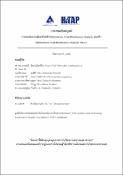Distributional Cost-Effectiveness Analysis Phase 1
วรรณฤดี อิสรานุวัฒน์ชัย;
Wanrudee Isaranuwatchai;
KC, Sarin;
ชิตวรรณ พูนศิริ;
Chittawan Poonsiri;
ภิชารีย์ กรุณายาวงศ์;
Picharee Karunayawong;
จุฬาทิพย์ บุญมา;
Chulathip Boonma;
มันตา กรกฎ;
Manta Korakot;
ปฤษฐพร กิ่งแก้ว;
Pritaporn Kingkaew;
Date:
2568-09
Abstract
 | ผลงานวิชาการเหล่านี้เป็นลิขสิทธิ์ของสถาบันวิจัยระบบสาธารณสุข หากมีการนำไปใช้อ้างอิง โปรดอ้างถึงสถาบันวิจัยระบบสาธารณสุข ในฐานะเจ้าของลิขสิทธิ์ตามพระราชบัญญัติสงวนลิขสิทธิ์สำหรับการนำงานวิจัยไปใช้ประโยชน์ในเชิงพาณิชย์ |
Fulltext
Total downloads:
| Today: | 0 |
| This month: | 0 |
| This budget year: | 8 |
| This year: | 14 |
| All: | 14 |
Collections
-
Research Reports [2531]
งานวิจัย
Related items
Showing items related by title, author, creator and subject.
-
การประเมินศักยภาพของระบบสุขภาพในความพร้อมรับมือการระบาดโรค COVID-19 ในพื้นที่ชายแดน จังหวัดเชียงราย
อนุสรณ์ อุดปล้อง; Anusorn Udplong; ธวัชชัย อภิเดชกุล; Tawatchai Apidechkul; ฟาติมา ยีหมาด; Fartima Yeemard (สถาบันวิจัยระบบสาธารณสุข, 2565-10)การวิจัยแบบภาคตัดขวางนี้มีวัตถุประสงค์เพื่อประเมินศักยภาพของบุคลากรและระบบสุขภาพในการดำเนินการป้องกันและควบคุมโรค COVID-19 ของหน่วยงานสังกัดกระทรวงสาธารณสุขและกระทรวงมหาดไทย ในพื้นที่อำเภอชายแดนจังหวัดเชียงราย คือ ... -
การพัฒนาประสิทธิภาพทางการคลังที่ยั่งยืนสำหรับระบบหลักประกันสุขภาพ และแบบจำลองการจัดสรรทรัพยากรกำลังคนด้านสุขภาพ
ทีปกร จิร์ฐิติกุลชัย; Theepakorn Jithitikulchai (สถาบันวิจัยระบบสาธารณสุข, 2564-06)โครงการวิจัยนี้มีวัตถุประสงค์ประกอบด้วย 2 ส่วน คือ 1) พื้นที่การคลังสาธารณสุข: ประมาณการช่องว่างในการกำหนดงบประมาณ (Fiscal Space) ของระบบหลักประกันสุขภาพถ้วนหน้าและระบบสาธารณสุข และ 2) การจัดสรรบุคลากร: ศึกษาช่องว่างอุปส ... -
ประชุมวิชาการระดับนานาชาติ สมาคมนักระบาดวิทยาภาคพื้นเอเชียตะวันออกเฉียงใต้ ด้านสาธารณสุขและการพัฒนาที่ยั่งยืน
ธวัชชัย อภิเดชกุล; Tawatchai Apidechkul (สถาบันวิจัยระบบสาธารณสุข, 2565-11)การประชุมวิชาการระดับนานาชาติ สมาคมรักระบาดวิทยาภาคพื้นเอเชียตะวันออกเฉียงใต้ ด้านสาธารณสุขและการพัฒนาที่ยั่งยืน (The 14th SEA Regional Scientific Meeting of the International Epidemiological Association and International ...

